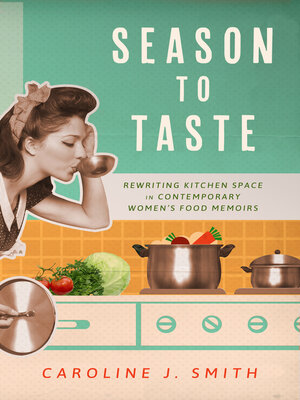Season to Taste
ebook ∣ Rewriting Kitchen Space in Contemporary Women's Food Memoirs · Ingrid G. Houck Series in Food and Foodways
By Caroline J. Smith

Sign up to save your library
With an OverDrive account, you can save your favorite libraries for at-a-glance information about availability. Find out more about OverDrive accounts.
Find this title in Libby, the library reading app by OverDrive.



Search for a digital library with this title
Title found at these libraries:
| Library Name | Distance |
|---|---|
| Loading... |
2024 Honorable Mention Recipient for the Emily Toth Award for the Best Single Work by One or More Authors from the Popular Culture Association
Between 2000 and 2010, many contemporary US-American women writers were returning to the private space of the kitchen, writing about their experiences in that space and then publishing their memoirs for the larger public to consume. Season to Taste: Rewriting Kitchen Space in Contemporary Women's Food Memoirs explores women's food memoirs with recipes in order to consider the ways in which these women are rewriting this kitchen space and renegotiating their relationships with food.
Caroline J. Smith begins the book with a historical overview of how the space of the kitchen, and the expectations of women associated with it, have shifted considerably since the 1960s. Better Homes and Gardens, as well as the discourse of the second-wave feminist movement, tended to depict the space as a place of imprisonment. The contemporary popular writers examined in Season to Taste, such as Ruth Reichl, Kim Sunée, Jocelyn Delk Adams, Julie Powell, and Molly Wizenberg, respond to this characterization by instead presenting the kitchen as a place of transformation. In their memoirs and recipes, these authors reinterpret their roles within the private sphere of the home as well as the public sphere of the world of publishing (whether print or digital publication). The authors examined here explode the divide of private/feminine and public/masculine in both content and form and complicate the genres of recipe writing, diary writing, and memoir. These women writers, through the act of preparing and consuming food, encourage readers to reconsider the changing gender politics of the kitchen.
Between 2000 and 2010, many contemporary US-American women writers were returning to the private space of the kitchen, writing about their experiences in that space and then publishing their memoirs for the larger public to consume. Season to Taste: Rewriting Kitchen Space in Contemporary Women's Food Memoirs explores women's food memoirs with recipes in order to consider the ways in which these women are rewriting this kitchen space and renegotiating their relationships with food.
Caroline J. Smith begins the book with a historical overview of how the space of the kitchen, and the expectations of women associated with it, have shifted considerably since the 1960s. Better Homes and Gardens, as well as the discourse of the second-wave feminist movement, tended to depict the space as a place of imprisonment. The contemporary popular writers examined in Season to Taste, such as Ruth Reichl, Kim Sunée, Jocelyn Delk Adams, Julie Powell, and Molly Wizenberg, respond to this characterization by instead presenting the kitchen as a place of transformation. In their memoirs and recipes, these authors reinterpret their roles within the private sphere of the home as well as the public sphere of the world of publishing (whether print or digital publication). The authors examined here explode the divide of private/feminine and public/masculine in both content and form and complicate the genres of recipe writing, diary writing, and memoir. These women writers, through the act of preparing and consuming food, encourage readers to reconsider the changing gender politics of the kitchen.







